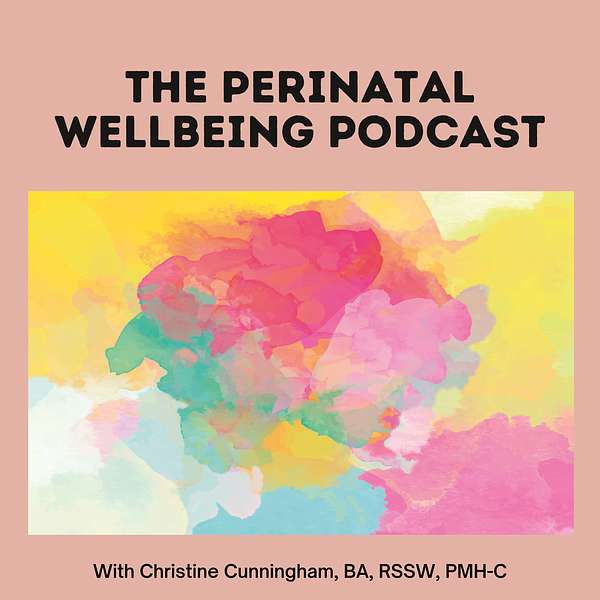
Perinatal Wellbeing - The Podcast about Prenatal, Pregnancy & Postpartum Health
Perinatal Wellbeing - The Podcast about Prenatal, Pregnancy & Postpartum Health
The Impacts of Racism on Reproductive Health with Rochelle Part 2
Content Warning: This is an in-depth discussion about racism and the impacts on reproductive health and can feel very heavy, especially for those who are impacted by these topics. We discuss things such as forced sterilization, interactions with CAS. Take care of yourself while listening.
Hello and welcome to Perinatal Wellbeing episode #22, the 2nd part of our discussion about the impact of Racism on Reproductive Health with Rochelle Maurice. Last episode we discussed obstetrical racism, reproductive justice, generational trauma and much more. On today’s episode we will talk about the importance of applying an intersectional lens when thinking about care of people in the perinatal period including the intersections of racism, disabilities and accessing care. Rochelle gives us some really great ways to think about challenging these systems to try and make change.
Rochelle Maurice is a clinical and organizational ethicist based in Toronto, Ontario. Her work in ethics was strongly influenced by her professional background in social work, the most significant of which was in the Neonatal Intensive Care Unit and Paediatrics department in a community hospital in Toronto. As a result of her experiences in both social work and ethics, Rochelle has an interest in and passion for addressing issues that affect pregnant, birthing, and postpartum people at the intersection of health and social care. She is currently pursuing doctoral studies in social work that focuses on Black women’s experiences in maternal-child care.
Highlights:
2:10 - Impacts of racism on birthing people in labour and delivery
9:01 - Applying an intersectional lens is key
16:11 – Higher rates of death during birth amongst BIPOC communities
19:19 - Intersections of racism, disabilities and accessing care
23:30 - Acknowledging privilege how we contribute to systems of oppression
29:40 – How do you call these systems into question? Asking questions, start small, educate, centering people who are not usually centred.
Resources:
You can find us at www.perinatalwellbeing.ca on Instagram @perinatalwellbeing_ontario or by email info@perinatalwellbeing.ca
If you are experiencing any of the symptoms discussed in this or any episode please reach out to me at info@perinatalwellbeing.ca and I can help you find support in your area or online.
Check out Postpartum Support International at www.postpartum.net for more information about Perinatal Mood and Anxiety Disorders as well as free online support groups and a provider directory.
You can look for an individual therapist on www.psychologytoday.com .
You can find Rochelle on Instagram @_rochellemaurice_
Content Warning: This is an in-depth discussion about racism and the impacts on reproductive health and can feel very heavy, especially for those who are impacted by these topics. We discuss things such as forced sterilization, interactions with CAS. Take care of yourself while listening.
Hello and welcome to Perinatal Wellbeing episode #22, the 2nd part of our discussion about the impact of Racism on Reproductive Health with Rochelle Maurice. Last episode we discussed obstetrical racism, reproductive justice, generational trauma and much more. On today’s episode we will talk about the importance of applying an intersectional lens when thinking about care of people in the perinatal period including the intersections of racism, disabilities and accessing care. Rochelle gives us some really great ways to think about challenging these systems to try and make change.
Rochelle Maurice is a clinical and organizational ethicist based in Toronto, Ontario. Her work in ethics was strongly influenced by her professional background in social work, the most significant of which was in the Neonatal Intensive Care Unit and Paediatrics department in a community hospital in Toronto. As a result of her experiences in both social work and ethics, Rochelle has an interest in and passion for addressing issues that affect pregnant, birthing, and postpartum people at the intersection of health and social care. She is currently pursuing doctoral studies in social work that focuses on Black women’s experiences in maternal-child care.
Highlights:
2:10 - Impacts of racism on birthing people in labour and delivery
9:01 - Applying an intersectional lens is key
16:11 – Higher rates of death during birth amongst BIPOC communities
19:19 - Intersections of racism, disabilities and accessing care
23:30 - Acknowledging privilege how we contribute to systems of oppression
29:40 – How do you call these systems into question? Asking questions, start small, educate, centering people who are not usually centred.
Resources:
You can find us at www.perinatalwellbeing.ca on Instagram @perinatalwellbeing_ontario or by email info@perinatalwellbeing.ca
If you are experiencing any of the symptoms discussed in this or any episode please reach out to me at info@perinatalwellbeing.ca and I can help you find support in your area or online.
Check out Postpartum Support International at www.postpartum.net for more information about Perinatal Mood and Anxiety Disorders as well as free online support groups and a provider directory.
You can look for an individual therapist on www.psychologytoday.com .
You can find Rochelle on Instagram @_rochellemaurice_